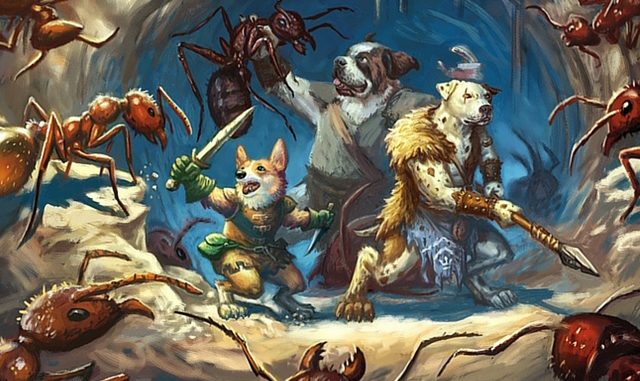
Recently I managed to finally get Pugmire on the table and run through an adventure module that I had written called “The One Who Waited.” This is a game I had written about at length back when I finally got my physical copy from the Kickstarter and I’m very pleased to say that everything I was excited about from my initial read through held to be true on the table.
The biggest takeaway from the game is that it is written and designed in a way that encourages cooperation and companionship over everything else in a game where a “lone wolf” character could be taken rather literally. My players were introduced to each other’s characters as a team, and I hope that they really felt like they were one as they moved through the adventure.
However, the biggest way that this spirit of cooperation and camaraderie is encouraged mechanically is the way Initiative is handled. Instead of rolling your Initiative score and going at a set value every round, the Initiative roll at the beginning of combat is simply to determine who goes first. When they have taken their turn, they decide which PC or NPC they wish to go next allowing them to set up effective combinations with other PCs (such as igniting the oil slick they just created under a monster before it can move) or allow NPCs to move into range so that the melee-focused characters don’t have to waste a turn doing nothing but moving. It encourages the players to think about the different directions the battle might develop based on who they choose to go next. Once everyone has had their turn, the character who went last decides who gets to go first for the next round and the entire process is gone through again until the combat is over. It seems clunky or potentially one-sided (why wouldn’t I have everyone on my side go first and take them out before they can hurt us), but it forces the opposite as you learn to take into account the skills of the other PCs. It was honestly easy enough online to list each PC and NPC group and check them off each time they had a turn, but I like the suggestion of dealing out a face-up card to everyone at the table and then flipping it over when their turn has been taken for physical games.

The game also places a strong emphasis on being suitably heroic. Now, I’m not necessarily talking about taking big risks for big rewards (though that does happen), but more about having the best qualities of a hero. They emphasize and encourage this through “The Code of Man,” a pseud0-religious/pseud0-secular series of basic tenets that dogs try to live their lives by. The first and most important of these tenets is “Be a good dog.” I saw more compassion for both comrades as well as slain enemies from a group of (mostly) strangers in four hours than I have from many gaming groups that have been together for a long time, because of that singular focus. They didn’t seem eager to fight, but more resigned to the fact that they had to do it.
For a peek behind the screen, I was a little bit worried going into writing the adventure, because the math of 5th Edition DND in terms of encounter design is not something I have a lot of practice with. However, Pugmire makes it incredibly easy. Because the characters only advance to level 10, so too do the monster’s challenge ratings, and they correspond 1:1. A monster with a challenge rating of 1 is a worthy threat for a level 1 character. Being that this party was a level 3 party, I got to put that to the test right away by throwing a swarm of zombies at them. I think I felt the collective mood shift downwards when I revealed just how many zombies were coming their way. But they dispatched them handily, leading me to believe that I had actually misjudged the difficulty of the first encounter by a fair bit.
Long story short, it was a lot of fun to finally get this game on the table, and it wasn’t long before it felt like the entire table was really into the game and the setting. I can’t wait to get this module polished up and run it some more after what I learned this first time.

…please don’t tell me this module is a reference to Hachiko. Q_Q
Okay. I won’t.